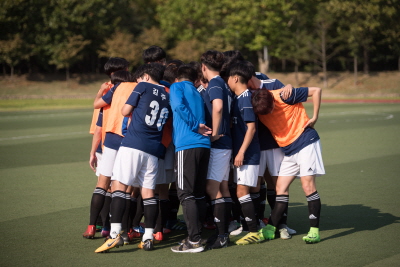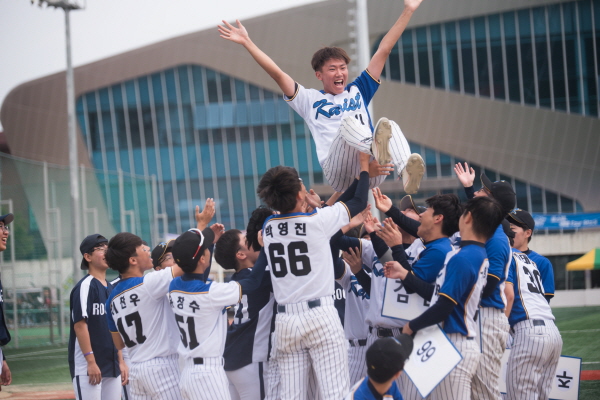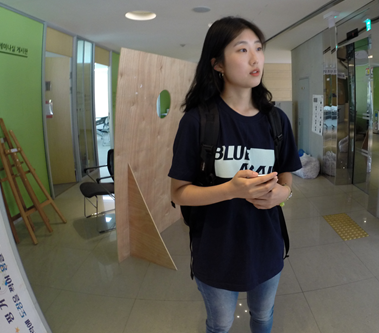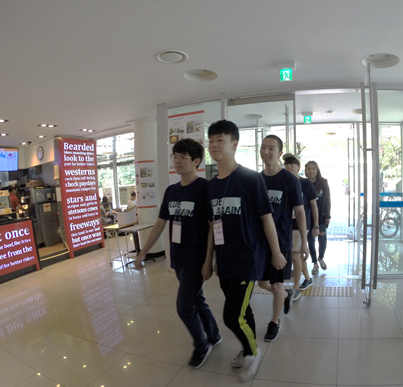event

The 16th Postech-KAIST Science War wrapped up its two-day rivals’ duel at the KAIST campus in Daejeon on September 23. The event was established in 2002 to build a close tie between the two renowned universities for science and technology, and to provide students with an opportunity to demonstrate their talents and abilities.

On September 21, a convoy of red Postech buses carrying more than 650 athletes, students, and supporters arrived at the KAIST campus in Daejeon. The two teams competed in eight events including both online and sports event.

The night before the actual games started, cheerleading teams from both Postech Cheero and KAIST ELKA kicked off the event.
1st Day (September 22)










(Jiwon Hwang, Public Relations of the 16th Science War Committee)

(The 16th Science War Committee)
Cheers to the students committees, participants, and supporters who put every ounce of their effort into successfully running the 16th Postech-KAIST Science War.

|
Day |
Category |
Winner |
|
Day 1 |
Hacking |
Postech |
|
Soccer |
KAIST |
|
|
Artificial Intelligence |
Postech |
|
|
E-Sports (LoL) |
Postech |
|
|
Day 2 |
Baseball |
KAIST |
|
Science Quizzes |
Postech |
|
|
Badminton (spin-off) |
KAIST |
|
|
Basketball |
KAIST |
(The final tally for KAIST in the Science Wars was eight wins and six losses)
-
event KAIST School of Computing Unveils 'KRAFTON Building,' A Symbol of Collective Generosity
< (From the fifth from the left) Provost and Executive Vice President Gyun Min Lee, Auditor Eun Woo Lee, President Kwang-Hyung Lee, Dean of the School of Computing Seok-Young Ryu, former Krafton member and donor Woong-Hee Cho, Krafton Chairman Byung-Gyu Chang > KAIST announced on May 20th the completion of the expansion building for its School of Computing, the "KRAFTON Building." The project began in June 2021 with an ₩11 billion donation from KRAFTON and its employees, eventually gr
2025-05-21 -
research “For the First Time, We Shared a Meaningful Exchange”: KAIST Develops an AI App for Parents and Minimally Verbal Autistic Children Connect
• KAIST team up with NAVER AI Lab and Dodakim Child Development Center Develop ‘AAcessTalk’, an AI-driven Communication Tool bridging the gap Between Children with Autism and their Parents • The project earned the prestigious Best Paper Award at the ACM CHI 2025, the Premier International Conference in Human-Computer Interaction • Families share heartwarming stories of breakthrough communication and newfound understanding. < Photo 1. (From left) Professor Hw
2025-05-19 -
research Decoding Fear: KAIST Identifies An Affective Brain Circuit Crucial for Fear Memory Formation by Non-nociceptive Threat Stimulus
Fear memories can form in the brain following exposure to threatening situations such as natural disasters, accidents, or violence. When these memories become excessive or distorted, they can lead to severe mental health disorders, including post-traumatic stress disorder (PTSD), anxiety disorders, and depression. However, the mechanisms underlying fear memory formation triggered by affective pain rather than direct physical pain have remained largely unexplored – until now. A KAIST resea
2025-05-15 -
research KAIST & CMU Unveils Amuse, a Songwriting AI-Collaborator to Help Create Music
Wouldn't it be great if music creators had someone to brainstorm with, help them when they're stuck, and explore different musical directions together? Researchers of KAIST and Carnegie Mellon University (CMU) have developed AI technology similar to a fellow songwriter who helps create music. KAIST (President Kwang-Hyung Lee) has developed an AI-based music creation support system, Amuse, by a research team led by Professor Sung-Ju Lee of the School of Electrical Engineering in collaboration
2025-05-07 -
research Editing Parkinson's Disease – KAIST Makes World's First Discovery of an Inflammatory RNA Editing Enzyme through Co-work with UCL Researchers
< Professor Minee Choi of the Department of Brain and Cognitive Sciences (top left). Professor Sonia Gandhi (top right) and Professor Klenerman of the University College London (bottom right) > Parkinson's disease (PD) is a neurodegenerative disorder in which the α-synuclein protein abnormally aggregates within brain cells, causing neuronal damage. Through international collaboration, researchers at KAIST have revealed that RNA editing plays a crucial role in regulating neuroi
2025-05-02